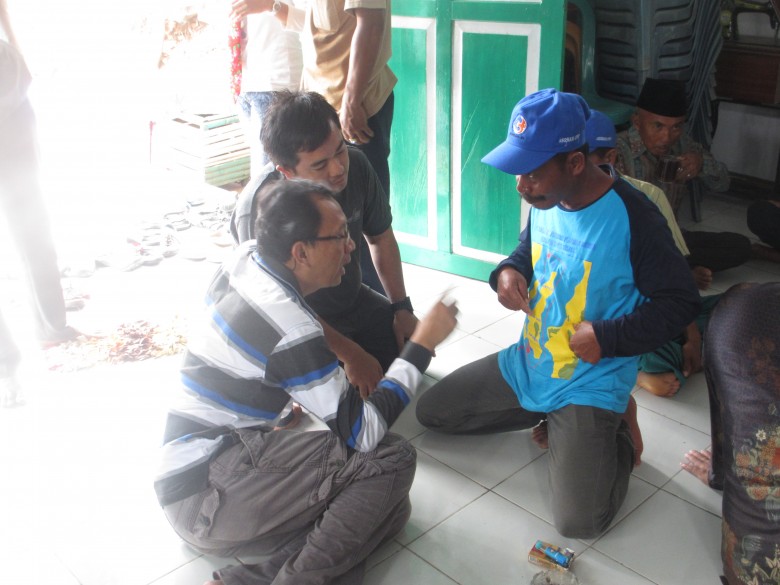
Innovation at its finest Pak Dedi Adhuri uses a handy map in discussions with community leaders (photo: H Ross)
Seeking long term impact on ecosystem health and community wellbeing
October 03 2016
It was truly exciting to be back out in the field at our pilot site of Selayar, South Sulawesi in September and to be part of the discussions and planning with our team of psychologists, social scientists and marine ecologists in determining how CCRES can contribute towards making long-term, sustainable changes for communities in improving their health and wellbeing and sustaining their coastal ecosystems.
As a key contribution towards long-term change, CCRES is trialing a new approach to this challenge in Selayar. Using expertise from The University of Queensland’s Positive Parenting Program (Triple P), and leading researchers from the Center of Coastal and Marine Resource Studies (IPB), UQ’s School of Agriculture and Food Sciences and LIPI (Indonesia), the team is focusing on achieving two objectives - firstly to reduce the risk factors causing individuals to damage marine ecosystems, while enhancing the factors that lead to protection of these ecosystems; and secondly to understand the dynamics of change-making in coastal social-ecological systems.
From this work the team will deliver two outputs: pilot an intervention looking at modifying behaviours and attitudes; and develop a toolkit consisting of a set of linked frameworks, principles and strategies. The toolkit is designed to assist governments, communities and NGOs to foster sustainable marine resource use and livelihoods in Indonesia, across multiple levels of formal and customary governance,
For me personally, it is inspiring to be part of the team creating the ideas and implementing the project, and working closely with the communities to bring benefits back to them.
This month also sees CCRES reaching its official ‘half-way’ point with the commencement of our Mid-Term Review. The review focuses on assessing the project’s progress, efficiency and effectiveness, as well as analysing constraints and challenges encountered and developing recommendations to enhance overall performance and effectiveness.
We are looking forward to the review and any recommendations that emerge. We are confident that the Project is delivering useful information, tools and outputs which will be utilised across the region by various stakeholders.
Over the coming months, we will continue to deliver more on our work, and to be motivated by the people we work with and the communities we have the privilege of working amongst.
Melanie King
Senior Advisor



